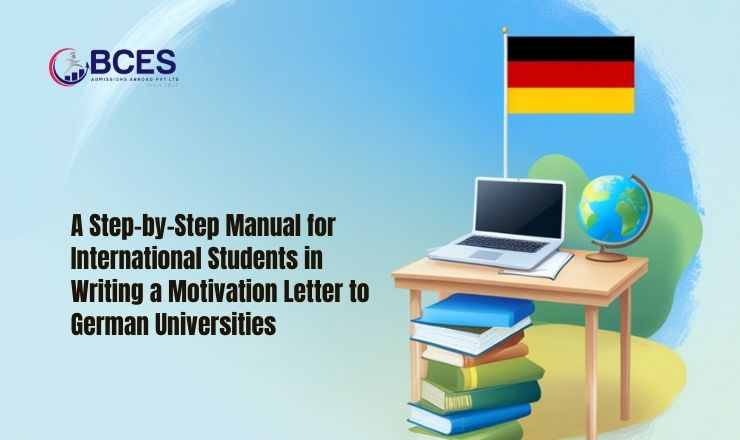A Step-by-Step Manual for International Students in Writing a Motivation Letter to German Universities

30 August 2025
Germany has gradually developed into being among the best options for foreign students. The synergy of having world-class universities, no or low tuition fees, a thriving research environment, and plenty of career options makes Germany a desired destination. However, strong marks and language proficiency are not always sufficient. Admission committees wish to get to know you, and this is where the Motivation Letter comes in.
Consider the Motivation Letter your introduction. Your academic records demonstrate what you have done, yet the Motivation Letter describes why you did so, what motivates you, and how your future is connected with the program. It is the connection between your past and your academic goals in Germany. Students tend to be confused between a Statement of Purpose (SOP), a Letter of Recommendation (LOR), and a Motivation Letter. Knowing the difference will make it easier to write a well-focused and persuasive application.
Motivation Letter vs SOP vs LOR – What’s the Difference?
On first impression, the Motivation Letter and SOP are quite alike, but German universities have different approaches.
An SOP tends to be more general and career-oriented. It describes your long-term professional and academic aims along with your readiness in a formal, organized manner.
A Motivation Letter is more about your personal affinity with the topic, the exact rationale you selected for a program or university in Germany, and how you can benefit the academic environment. It must be sincere and encompass your own journey.
A Letter of Recommendation (LOR) is authored by another person—more likely a professor or employer—testifying to your abilities, achievements, and personality. Whereas a LOR confirms your promise from someone else’s point of view, the Motivation Letter is your chance to introduce your voice, hopes, and singularity.
It is honesty and directness that are appreciated in German universities. It is not about elaborate vocabulary or trite expressions when it comes to a good Motivation Letter but about being genuine, specific, and relevant.
How to Write an Excellent Motivation Letter for German Universities
An effective Motivation Letter involves a well-balanced blend of personal anecdote and academic appropriateness. Admissions officers are interested in learning that you’ve done your homework, so show why this program is exactly right for you.
Begin with a compelling introduction that concisely states who you are and what led to your interest in the topic. The second section should bridge your past experiences—e.g., academic work, internships, or professional work—to your preparedness to undertake the program. Close with a future-focused conclusion, describing how the course fits into your career goals and how you will enrich the university community.
As opposed to some other nations’ applications for which flowery or melodramatic language may be typical, German institutions like straightforward, logical, and plain talk. Structure is also important: a clear one at that. The letter should not exceed 1 to 1.5 pages in length.
Most crucial, though, is personalization. Don’t use templates or generic online examples. Instead, question yourself: What makes my story special? For instance, if you are applying to a mechanical engineering course, don’t say you “like problem-solving.” Describe a particular project where you either designed or constructed something that aroused your interest. If you are undertaking social sciences, outline how a personal or neighborhood experience influenced your interest. These concrete, personal experiences make admissions officers recall your application.
Relevance of Motivation Letters
Since 2025, a number of German universities have been focusing on issues like sustainability, digitalization, and global justice. The programs are more interdisciplinary, inviting students to link their study area to global challenges.
This implies that your Motivation Letter not only needs to point out your academic ability but also display awareness of contemporary world issues. Demonstrate how you intend to address these issues in the course of your study in Germany. If you are applying for business studies, for instance, you may refer to enthusiasm for green business models; for technology studies, you could refer to interest in AI-based innovation. This anticipation of the future will set your application apart.
The Motivation Letter is not merely another paper in your application. It is your opportunity to make the admissions team get to know you, your passion, and your purpose aside from grades. It provides background to your life, reveals your vision for the future, and tells them why you are a suitable candidate for their program.
At BCES Admissions Abroad, we are aware of how important this letter is in the formation of your application. Our experts offer tailored consultancy to assist students in crafting Motivation Letters that speak about their uniqueness, readiness for academic pursuits, and aspirations as well as complement the hopes of German universities. Contact us at +91 9319996330.
Frequently Asked Questions (FAQs)
Typically, it should be one to one and a half pages long. German universities like brief, organized writing.
It is advisable to customize each letter. Referencing individual modules, professors, or opportunities at the university demonstrates interest. Generic letters usually go unread.
Both are important but in distinct ways. The LOR comes as an external certification of your ability, whereas the Motivation Letter is your own opportunity to demonstrate motivation, enthusiasm, and aptness.
If you are applying for an English-taught program, it is acceptable to submit it in English. But if the program is German-taught, composing the letter in German shows dedication and language skills.
The most significant errors are the use of clichés, copying web samples, making the letter too lengthy, and being unclear on reasons for program selection. Each sentence must be of some value and remain pertinent.